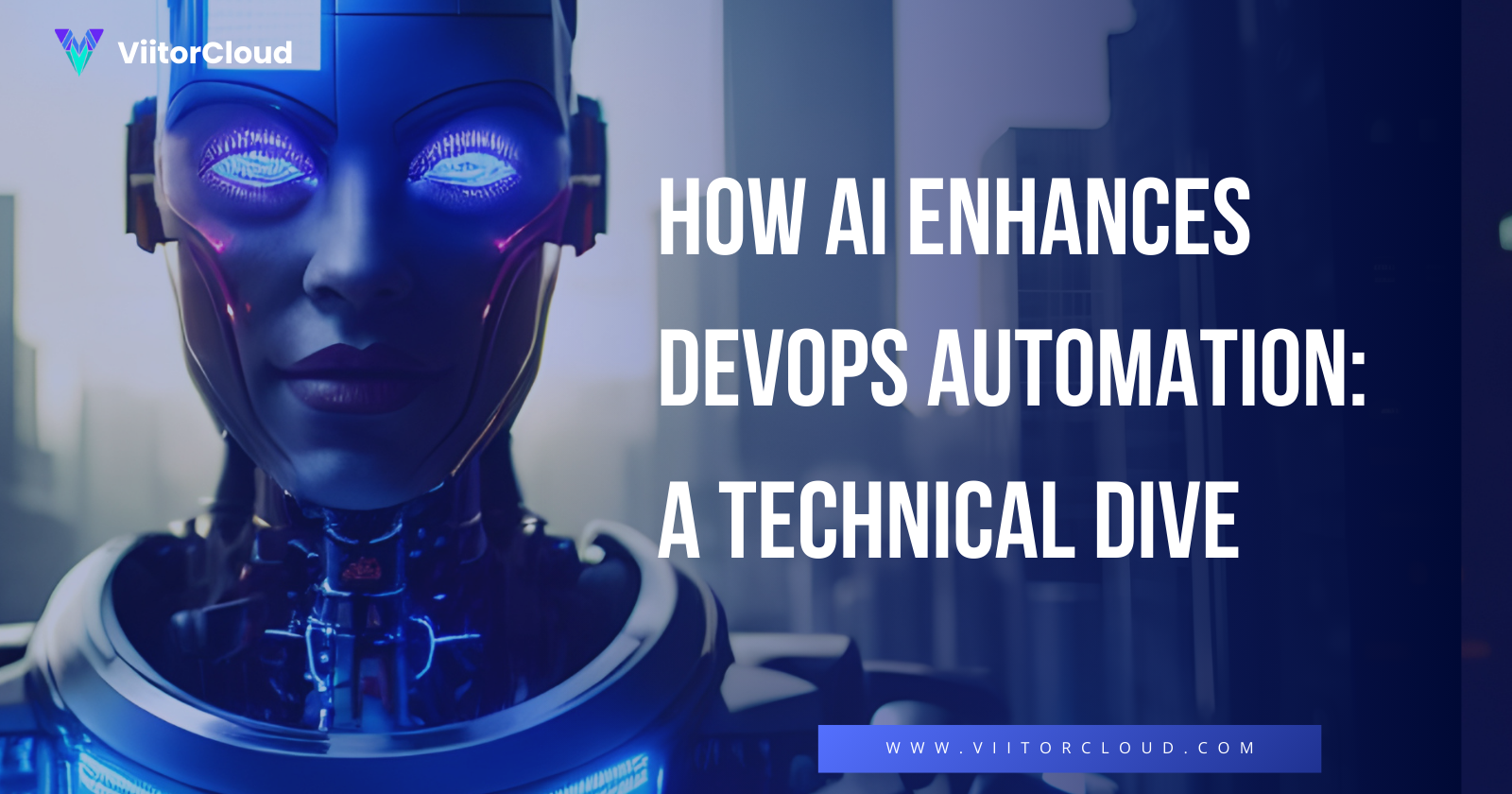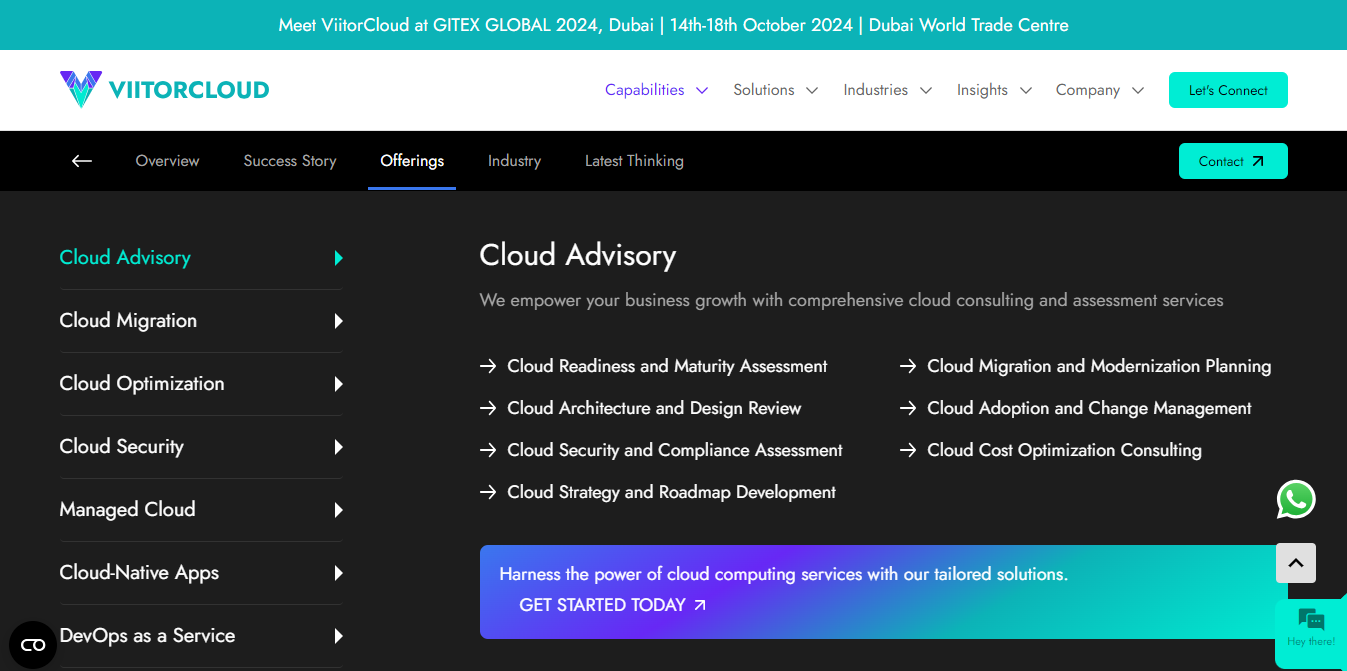How AI Enhances DevOps Automation: A Technical Dive
 ViitorCloud Technologies
ViitorCloud Technologies
In the world of software development, speed and efficiency in software development are vital. This is where DevOps automation comes into play. But what is it, and why does it matter? DevOps automation uses tools and technology to automate repetitive tasks in the development lifecycle, such as testing, integration, deployment, and monitoring. This approach reduces human error, speeds up processes, and frees developers to focus on what truly matters—innovation.
A report by Markets and Markets shows that the DevOps market is projected to grow from $3.42 billion in 2018 to $12.85 billion by 2025. This indicates a significant shift towards automated development processes. However, while automation improves efficiency, it often struggles with the complexities of modern development environments. This is where Artificial Intelligence (AI) steps in, taking automation in DevOps to the next level.
AI in DevOps automation doesn’t just streamline processes; it adds intelligence. AI-powered tools help DevOps teams predict issues, optimize resource allocation, and automate complex decision-making. This leads to faster, more reliable development cycles. Organizations can continuously improve their operations, delivering high-quality software at scale while remaining agile.
At ViitorCloud, we understand the transformative power of AI in DevOps. In this blog, we will explore how AI is transforming DevOps automation, discuss the DevOps tools driving this change, and highlight trends shaping the future of this evolving field.
What is DevOps Automation?
What is DevOps automation, and why is it important?
DevOps automation involves using software tools to automate repetitive tasks in software development, including coding, testing, deployment, and monitoring. By automating these tasks, teams can accelerate delivery timelines and maintain high-quality standards. This approach is essential for organizations looking to stay competitive in the ever-evolving tech landscape.

At ViitorCloud, we leverage our expertise in Cloud Services to enhance your DevOps automation efforts, ensuring seamless integration and deployment across your projects.
How Does AI Enhance DevOps Automation?
Why is AI a Game-Changer for DevOps Automation?
Integrating AI for DevOps is revolutionizing how development and operations teams work. Traditional DevOps automation improves speed but often lacks the capacity to tackle complex, data-driven challenges. AI changes this by introducing predictive capabilities into the DevOps strategy. With AI, systems can autonomously adapt, learn from previous actions, and predict issues before they occur.
How does AI integrate with automation in DevOps?
AI integrates into DevOps automation through machine learning algorithms and data analysis capabilities. For instance, AI-driven monitoring tools can predict system failures by analyzing historical data and real-time performance metrics. Similarly, AI-enhanced testing frameworks can identify areas of code likely to fail.
This integration goes beyond automating workflows; it introduces intelligence that enables proactive management. AI-powered tools can identify performance bottlenecks, suggest fixes, and optimize resource usage throughout the software lifecycle. AI also aids continuous integration and continuous deployment (CI/CD) pipelines by optimizing the release process, reducing time to market while maintaining high-quality standards.
Key AI Applications in DevOps
How is AI Used in DevOps Tools?
AI in DevOps enhances popular DevOps tools, allowing teams to achieve higher efficiency, precision, and scalability. Here’s how:
AI in Continuous Integration/Continuous Deployment (CI/CD): AI streamlines CI/CD pipelines by automating tasks like testing, code integration, and deployment. Tools like Jenkins X optimize these workflows, improve build times, and prioritize testing based on code changes.
Monitoring and Incident Management: Tools like Datadog and New Relic use machine learning to analyze performance data and detect anomalies, alerting teams before issues become critical. This proactive approach minimizes downtime and enhances system reliability.
Automated Testing: Tools like Testim leverage AI to automate test creation and execution, reducing manual testing efforts while improving accuracy. This leads to faster release cycles and higher software quality.
Infrastructure Management: AI tools such as HashiCorp’s Terraform predict infrastructure needs and optimize resource allocation, ensuring applications run smoothly without over-provisioning.
What is AI for DevOps, and How Does it Work?
AI for DevOps, often called AIOps (Artificial Intelligence for IT Operations), uses AI algorithms and machine learning models to make DevOps processes smarter. Here’s how:
Predictive Analysis: AI algorithms analyze historical and real-time data to predict potential system failures or performance bottlenecks.
Anomaly Detection: AI excels at identifying outliers in data. Tools like Splunk use AI to monitor system logs and application metrics, flagging unusual activity before it escalates into a problem.
Self-Healing Systems: Some DevOps tools are becoming self-healing. For instance, tools like ServiceNow’s AI-powered IT Operations Management automatically detect issues and implement fixes without human intervention.
Automated Decision-Making: AI can analyze vast amounts of data quickly, automating decisions like when to deploy new features based on traffic patterns.
Root Cause Analysis: When issues arise, AI can speed up root cause analysis by identifying the likely cause through log analysis, reducing downtime and improving incident response times.
How Does AI Impact DevOps Strategy?
What Should a Modern DevOps Strategy Include?
A modern DevOps strategy should incorporate AI-driven insights to predict, optimize, and scale operations. Here are key components shaped by AI:
Automation with Intelligence: Traditional automation focuses on task completion, while AI enhances this by enabling systems to analyze data and make decisions.
Data-Driven Decision Making: AI-powered tools can analyze vast amounts of development data, allowing teams to make informed decisions quickly.
Scalability: AI helps manage complex scaling operations, analyzing user behavior and resource usage to optimize allocation efficiently.
Proactive Monitoring and Maintenance: AI-driven monitoring systems continuously track performance, detecting anomalies before they impact users.
How Can AI Shape or Refine a Company’s DevOps Strategy?
AI can profoundly refine a company’s DevOps strategy. Here’s how:
Enhancing Workflow Efficiency: AI identifies inefficiencies and recommends improvements based on historical data, allowing teams to streamline their processes.
Smarter Resource Management: AI enables dynamic resource allocation, optimizing infrastructure usage and reducing costs.
Predictive Risk Management: AI tools offer predictive analytics to identify potential risks before they occur, allowing proactive measures to be implemented.
Continuous Feedback Loops: AI streamlines CI/CD by constantly learning from past deployments and generating real-time feedback, improving future releases.
Security Automation: AI strengthens security by automating threat detection and response, reducing potential damage from breaches.
AI-Driven Recommendations for Improving DevOps Workflows
Automate Routine Tasks with AI: Use AI to handle repetitive tasks, allowing developers to focus on strategic initiatives that drive innovation.
Leverage AI for Continuous Monitoring: Implement AI tools for real-time monitoring, helping detect anomalies before they escalate into major issues.
Integrate AI in the CI/CD Pipeline: Use AI to analyze data from CI/CD processes and suggest improvements to enhance efficiency.
AI-Enhanced Collaboration: AI can facilitate better communication and task assignments between development and operations teams, fostering collaboration.
Focus on Continuous Learning: Include feedback loops that allow AI to learn from previous deployments and optimize processes over time.
What Trends are Shaping AI and DevOps?
What are the Latest DevOps Trends?
The integration of AI into DevOps is changing how organizations manage software development. Here are some of the latest trends:
AIOps: This combines AI and machine learning to enhance IT operations, allowing for better monitoring and management of systems.
Automated Code Review and Testing: AI tools automate code reviews, improving quality and reducing manual effort, which leads to faster release cycles.
Predictive Analytics for Deployment Success: AI predicts the likelihood of success or failure for deployments, enabling proactive measures to mitigate risks.
Intelligent CI/CD Pipelines: AI optimizes CI/CD pipelines by adjusting processes based on code complexity and traffic patterns, leading to faster deployments.
AI-Driven Monitoring and Observability: AI tools monitor systems and provide real-time insights, helping teams detect performance issues faster.
Infrastructure as Code (IaC) Automation: AI tools optimize infrastructure management, ensuring resources are effectively utilized and reducing operational costs.
Predictions for the Future of AI in DevOps
As AI continues to evolve, its role in DevOps will expand. Here are some predictions:
Full Autonomy in Operations: We may see fully autonomous DevOps environments where AI manages the entire development lifecycle, streamlining processes significantly.
AI-Driven DevSecOps: Security will integrate deeply with DevOps, with AI automating threat detection and response to improve security posture.
Proactive Self-Healing Systems: Future systems will have the capability to self-diagnose and resolve issues without human input, minimizing downtime and enhancing reliability.
Increased Collaboration with AI Assistants: AI will streamline communication and task assignments in DevOps workflows, enhancing team efficiency.
Hyper-Personalized Developer Environments: AI tools will adapt to individual workflows, improving developer productivity and satisfaction.
Predictive Maintenance and Optimization: AI will enable proactive resource management, optimizing performance and reducing downtime through intelligent analysis.
At ViitorCloud, we stay ahead of these trends, offering tailored solutions to help your business capitalize on AI-driven DevOps innovations. Our expertise in information technology ensures that your DevOps processes are future-proof and scalable.
Conclusion
AI is revolutionizing DevOps automation, helping organizations automate complex tasks, optimize resource usage, and improve reliability. By integrating AI into DevOps workflows, businesses can predict issues, optimize system performance, and scale efficiently.
ViitorCloud is here to support your journey toward smarter, more efficient DevOps automation. Our tailored solutions and deep expertise in cloud services and information technology enable us to design intelligent DevOps strategies that drive business success. If you're ready to enhance your DevOps capabilities, contact us today.
Subscribe to my newsletter
Read articles from ViitorCloud Technologies directly inside your inbox. Subscribe to the newsletter, and don't miss out.
Written by

ViitorCloud Technologies
ViitorCloud Technologies
ViitorCloud is an IT Solutions Company headquartered in India. ViitorCloud provides niche digital solutions across the globe. We are a group of enthusiastic professionals.